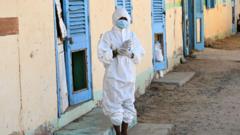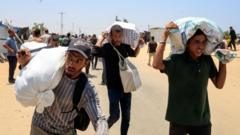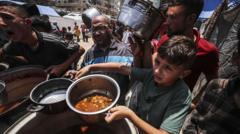With the recent surge in cholera cases leading to significant fatalities, Sudan's health infrastructure remains critically threatened. Aid groups highlight the need for urgent interventions as the civil war exacerbates the health crisis.
Sudan Faces Imminent Health Catastrophe Amid Cholera Surge

Sudan Faces Imminent Health Catastrophe Amid Cholera Surge
The International Rescue Committee warns that Sudan is on the brink of a health disaster, as cholera spreads rapidly due to weakened infrastructure exacerbated by ongoing conflict.
The civil war ravaging Sudan has pushed the country to a critical point in terms of public health, as the International Rescue Committee (IRC) warns of an imminent disaster fueled by a cholera outbreak. Recent statistics reported by Sudan's Health Ministry reveal that 172 individuals have succumbed to the illness within a single week, predominantly in Khartoum state. Local medical practitioners attribute these rising numbers to inadequate access to clean drinking water; drone assaults have knocked out power to water purification facilities, compelling residents to rely on contaminated water sources.
IRC's Sudan country director, Eatizaz Yousif, remarked that the ongoing civil strife—now in its third year—has contributed significantly to the resurgence of cholera. The organization also pointed out that vaccination efforts remain alarmingly low, and essential medical supplies are rapidly depleting. In tandem, the medical charity Doctors Without Borders (MSF) has raised alarms over "thousands of suspected cholera cases" emerging in Khartoum since last month, emphasizing how the violence has severely compromised essential infrastructure and healthcare services.
MSF’s medical coordinator in Sudan, Slaymen Ammar, emphasized the dire situation, noting that healthcare resources in many regions have become either inaccessible or prohibitively expensive. He lamented that many healthcare workers have felt compelled to abandon their posts amid escalating hostilities. The organization reported a staggering 500 new cholera cases in just one day last week, with additional cases documented across northern and southern regions of Sudan.
Cholera, while often manageable with prompt medical intervention, can become fatal due to severe diarrhea—prompting the need for antibiotics and IV fluids, according to the World Health Organization. The ongoing conflict, which has seen over 150,000 fatalities since its onset, has displaced millions and triggered what the UN deems the world's most severe humanitarian crisis.
IRC's Sudan country director, Eatizaz Yousif, remarked that the ongoing civil strife—now in its third year—has contributed significantly to the resurgence of cholera. The organization also pointed out that vaccination efforts remain alarmingly low, and essential medical supplies are rapidly depleting. In tandem, the medical charity Doctors Without Borders (MSF) has raised alarms over "thousands of suspected cholera cases" emerging in Khartoum since last month, emphasizing how the violence has severely compromised essential infrastructure and healthcare services.
MSF’s medical coordinator in Sudan, Slaymen Ammar, emphasized the dire situation, noting that healthcare resources in many regions have become either inaccessible or prohibitively expensive. He lamented that many healthcare workers have felt compelled to abandon their posts amid escalating hostilities. The organization reported a staggering 500 new cholera cases in just one day last week, with additional cases documented across northern and southern regions of Sudan.
Cholera, while often manageable with prompt medical intervention, can become fatal due to severe diarrhea—prompting the need for antibiotics and IV fluids, according to the World Health Organization. The ongoing conflict, which has seen over 150,000 fatalities since its onset, has displaced millions and triggered what the UN deems the world's most severe humanitarian crisis.



















